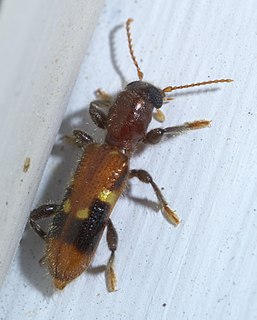| Aegialia spinosa | |
|---|---|
| Scientific classification | |
| Kingdom: | Animalia |
| Phylum: | Arthropoda |
| Class: | Insecta |
| Order: | Coleoptera |
| Family: | Scarabaeidae |
| Genus: | Aegialia |
| Species: | A. spinosa |
| Binomial name | |
| Aegialia spinosa Gordon & Cartwright, 1988 | |
Aegialia spinosa is a species of aphodiine dung beetle in the family Scarabaeidae. [1] [2] [3] [4] It is found in North America. [1]
In biology, a species is the basic unit of classification and a taxonomic rank of an organism, as well as a unit of biodiversity. A species is often defined as the largest group of organisms in which any two individuals of the appropriate sexes or mating types can produce fertile offspring, typically by sexual reproduction. Other ways of defining species include their karyotype, DNA sequence, morphology, behaviour or ecological niche. In addition, paleontologists use the concept of the chronospecies since fossil reproduction cannot be examined.

Dung beetles are beetles that feed on feces (dung). Beetles in some species of dung beetles can bury dung 250 times heavier than themselves in one night.

The family Scarabaeidae, as currently defined, consists of over 30,000 species of beetles worldwide; they are often called scarabs or scarab beetles. The classification of this family has undergone significant change in recent years. Several subfamilies have been elevated to family rank, and some reduced to lower ranks. The subfamilies listed in this article are in accordance with those in Bouchard (2011).








